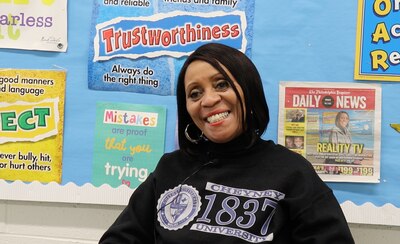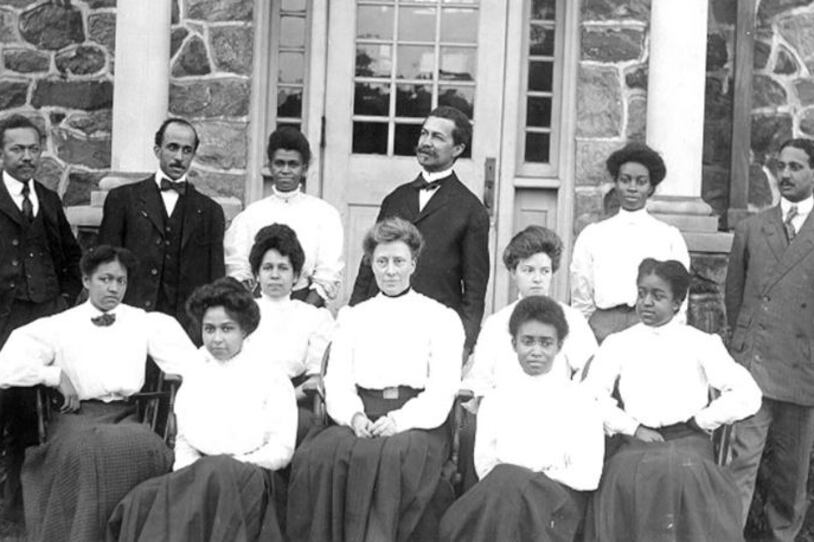Joyce Abbott always wanted to be a teacher.
For the Hamilton Elementary School educator, who is the namesake of the hit show “Abbott Elementary,” the road to becoming a teacher took some turns, but ultimately hit pay dirt at Cheyney University outside Philadelphia.
“A lot of people don’t know, but I did my undergrad studying business and economics, because I thought that was something I really wanted to do at that time,” she said. “But the love for teaching has always been a part of my life with my family.”
Abbott attributes her success as a teacher to the small classes, student collaboration, and strong professors at the university, which celebrated the 185th anniversary of its founding last week.
The oldest historically Black college, or HBCU, in the country, Cheyney is looking to rebuild the university’s legacy of producing teachers like Abbott at a time when many are leaving the profession. University leaders are also looking to improve teacher diversity numbers, as white teachers still account for the majority of U.S. teachers. According to a recent report from the Pew Research Center, about 79% of U.S. public school teachers are white; Black teachers accounted for about 7% of the country’s teaching force, while Latino teachers accounted for 9%, and Asian American teachers 2%.
The Philadelphia school district has struggled with recruiting and retaining teachers of color and also has seen a midyear surge of teacher resignations. In the city’s district schools, about 24% of teachers are Black, but the district is predominantly Black and Latino.
Abbott returned to Cheyney after serving in the military and attended the school’s graduate program for elementary education. She will retire at the end of this school year after teaching for 40 years.
“I will tell you a lot of the stronger teachers in Philadelphia obtained their education degree from Cheyney,” Abbott said. “They would go into schools and just be phenomenal. And that was a direct result of the instruction and training they received from Cheyney.”
Cheyney was founded by Quaker philanthropist Richard Humphreys in 1837 as the African Institute and later renamed the Philadelphia Institute for Colored Youth. Training Black teachers became the foundation of the school’s success.
When the institute opened its doors, it became the first high school for Black people in the U.S. — 28 years before the Thirteenth Amendment was adopted to officially abolish slavery, freeing more than 3.9 million enslaved Black people. In its mission, Humphreys called for the school “to instruct the descendants of the African race in school learning, in the various branches of the mechanic arts, trades and agriculture, in order to prepare and fit and qualify them to act as teachers.”

The school’s first location stood at Seventh and Lombard streets in South Philadelphia, then it moved to a larger building at Ninth and Bainbridge streets in what is known as the Samuel J. Randall School. The building is listed on the National Register of Historic Places.
One of the most famous figures associated with the early years of the institute is Fanny Coppin, a former slave who became a principal and was credited with advancing the school’s curriculum. Last year, the city’s Board of Education renamed Andrew Jackson Elementary School in South Philadelphia after Coppin, who is also the namesake of Coppin State University, an HBCU in Baltimore.
The institute also is mentioned on HBO’s “The Gilded Age” – Peggy Scott, a lead Black character, tells white observers who are fascinated by her advanced writing skills that she is a graduate of the institute in Philadelphia.
The university got its name after moving in 1902 to a farm named after another Quaker George Cheyney. It was renamed the Cheyney Training School for Teachers in 1914 and then Cheyney State Teachers College in 1951, a reflection of its focus on educating future teachers. During this time the majority of the university’s graduates studied education and went on to be teachers in nearby cities like Baltimore, New York City and Philadelphia.
“Cheyney became the option, the place to go for Blacks to have undergraduate and graduate education,” said Robert W. Bogle, a Cheyney graduate and member of the State Board of Governors, which oversees Pennsylvania’s State System of Higher Education that consists of 14 colleges and universities including Cheyney.
“Our sister institutions did not want Black students at their schools,” Bogle said. “Being a teacher became a profession needed for our community but desperately needed to prepare African American or Black children, and Cheyney was the largest of its kind in preparing teachers, particularly for the Philadelphia public school system, which was growing in a Black population.”
As time went on, job opportunities for Black people grew, and training and education became needed in other areas. The most popular majors at Cheyney today are science, technology, engineering and mathematics, or STEM, business management, liberal arts and psychology.
“There was a time that Cheyney relied almost 100% exclusively on the training of teachers,” said Aaron Walton, president of Cheyney University. “And that was an admirable thing to do. But Cheyney has had to make some changes in the way they’ve operated in terms of being able to be sustainable. So it has to offer more than one type of education, because it has to satisfy many demands.”
But Cheyney might have a reason to emphasize its education program again.
At a Board of Education meeting last week, officials in the Philadelphia school district discussed data showing that teacher resignations were up almost 200% midyear, compared to last school year. The resignations are coming at a time when the ratio of students to teachers of color in Pennsylvania is among the worst in the nation.
District officials say they are committed to improving those numbers through several strategies, including higher salaries, retention bonuses, and early notification of intent to retire or resign.
Monica Lewis, spokesperson for the school district, said, “we believe that it’s important for our workforce to reflect the rich diversity of our student body. We have a multi-faceted approach to increasing teacher diversity throughout our schools.”
Walton said he thinks Cheyney could assist with both issues, in part, through its summer program, Aspire to Educate or A2E. The enrichment program was built to inspire high school students to consider a career in education. It’s free and is designed to introduce students to the rewards and benefits of teaching, Walton said.
The program is a collaboration among Cheyney, the School District of Philadelphia, Pennsylvania Department of Education, and the Community College of Philadelphia to track students who are in the 10th, 11th, and 12th grades, and encourage them to go into teaching. To apply to the program, a student has to be a graduating senior with a minimum GPA of 3.0. The student must also achieve at least 1,000 or higher on the SAT.
On the collegiate level, Cheyney offers degrees in early childhood education, early childhood education for prekindergarten to fourth-grade, and special education for prekindergarten to eighth-grade, through its Department of Business, Education and Professional Studies.
“With the model that we’re creating here at Cheyney, bringing private industry on campus, with a focus on having those partners provide internships for our students, it’s giving them an experience that they would not get anywhere else,” Walton said.
For Black students to study at an HBCU and return to the community as a teacher is where true change can happen, said Abbott. She believes it’s important for Black students to see people who look like them in a professional setting. The connection with students, she said, resonates.
“A lot of times in their neighborhood they don’t see a lot of positive role models. And as a Black teacher you can relate to the things they are going through,” she said.
Bureau Chief Johann Calhoun covers K-12 schools and early childhood education in Philadelphia. He oversees Chalkbeat Philadelphia’s education coverage. Contact Johann at jcalhoun@chalkbeat.org






